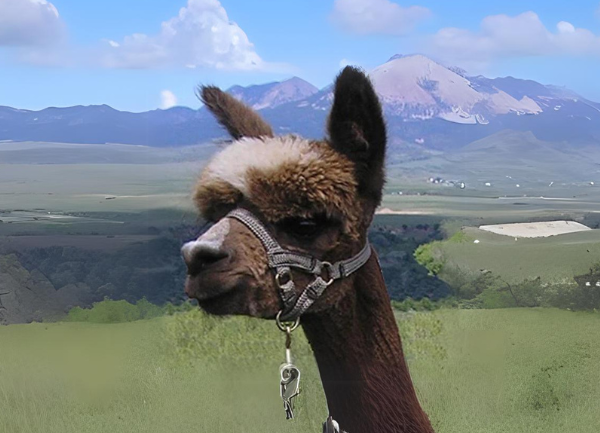I believe one of the most essential, healthiest long-term processes you can do for your alpaca is to train them. Just like the rest of us, the more experience we have in the outside world, the more confidence we all have in ourselves and our surroundings.
Alpacas are naturally shy, nervous creatures. They are akin to rabbits, constantly watching to see who is going to grab them. Thus, for your sake of enjoyment and safety and the alpaca’s confidence in the world and you, train them.
After 15+ years, here is a brief overview of how we work with our alpacas. We usually wean at 6 months old.
We take them away from their mothers and give them 3-4 weeks to adjust and get used to being alone. Fortunately, even older, more wild alpacas can also be worked and are usually trainable when worked handled properly.
Day 1: Put on a halter. Tie them tightly (5-8” rope length) to a post / rail / fence. Let them go in 5 minutes. Give them a treat.
Day 2-5: Repeat, adding 5 minutes each day.
Day 6-10: Tie up, but start to desensitize them. This means, start to pet them, put your hands on their back, legs, belly, under the chin, inside their mouth, in their ears. Lift their feet to get them used to toe trimming. They need to get used to being handled so they can be given health checks, medicine, untangled in ropes, whatever the need may be.
From this point on, tie them up, desensitize and begin to walk. Keep the others tied up during this time. This video includes excerpts of different training phases. Go slow, take your time and do not get frustrated. We had a group of 8 different volunteers to help us out this year, which was great for all of us so each alpaca received a lot of one-on-one time.
After a few weeks, create obstacle courses - walking over things, loading into trailers, balance on weigh scales and especially walk away from their friends and the rest of their herd.
We walk ours up 3 stairs onto the porch, on flattened cardboard boxes, on shearing mats, everything we can think of. This way, if / when they go to the vet, to shows, to events they will be confident of themselves and your ability to keep them safe.
